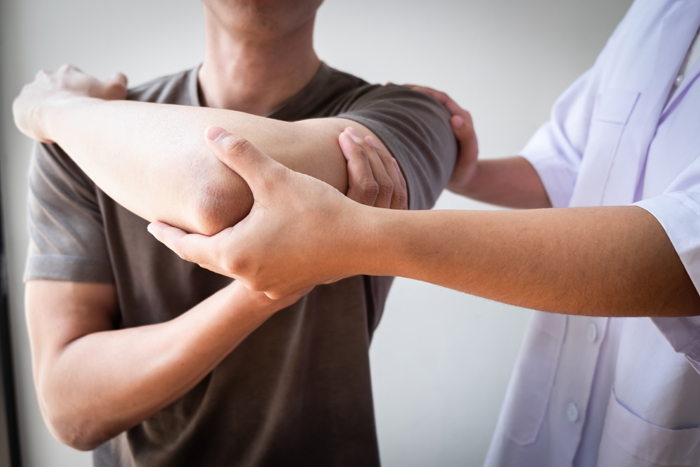Rotator Cuff Tear Treatment in Kondapur, Hyderabad
The rotator cuff is a collection of four muscles that join as tendons to form a protective covering around the humeral head. It is a ligament that connects the humerus to the shoulder blade and aids in the rotation as well as while lifting the arm. It is responsible for keeping the arm in the shoulder socket.
What is a Rotator Cuff Tear?
Between the rotator cuff and the acromion, a lubricating sac called the bursa is located. When we move our arms, the bursa permits the rotator cuff tendons to slide freely. It can become inflamed and uncomfortable when the rotator cuff tendons are damaged or torn. The tendon doesn’t entirely connect to the head of the humerus when one or more of the rotator cuff tendons is damaged.

What Are the Symptoms of Rotator Cuff Tear?
Following are the signs and symptoms of a rotator cuff tear;
- You may experience pain when lowering or lifting your arm or when performing specific actions.
- When moving your shoulder in different positions, you may experience a crackling feeling or crepitus.
- You experience while resting and at night while sleeping, especially when laying on the afflicted shoulder.
- You would also feel weakness while rotating or lifting your arm.
What Are the Causes of Rotator Cuff Tear?
The two main causes of rotator cuff tears include;
- Acute tear – You can tear your rotator cuff if you fall on your arm while it is outstretched or lift a heavy object with a jerk. Sometimes, shoulder injuries such as shoulder dislocation or collarbone fracture can also cause an acute rotator cuff tear.
- Degenerative tear – Degenerative tears of the rotator cuff are tears that occur as a result of the tendon gradually wearing down over time. As we get older, our bodies naturally degenerate. Generally, degenerative tears occur in the dominant arm. Also, the chances of a rotator cuff tear in the other shoulder are higher if you have a tear in one shoulder. These tears may occur due to several factors such as bone spurs, repetitive stress on the same shoulder such as while playing sports, and lack of blood supply to the rotator cuff.
When to See a Doctor?
You should see a doctor if you are experiencing chronic pain in your shoulder and arm, or if you have an injury to your shoulder.
Request an appointment at Apollo Spectra Hospitals, Kondapur
Call 1860-500-2244 to book an appointment
What are the Risk Factors of Rotator Cuff Tears?
Several factors can increase the risk of rotator cuff tears, including –
- People above the age of 40 are at a higher risk of rotator cuff injuries due to the usual wear and tear that comes with ageing.
- Rotator cuff tears are also common in people who engage in overhead activities or repetitive lifting. Pitchers in baseball and tennis players, in particular, are highly susceptible to rotator cuff tears. People who are carpenters, painters, or engage in overhead work are more prone to rotator cuff tears.
- Traumatic injuries such as a bad fall can also cause rotator cuff tears, especially in younger people.
How is Rotator Cuff Tear Diagnosed?
To diagnose rotator cuff tears, your doctor at Apollo Kondapur will first ask you about your symptoms and review your medical history. They will then physically examine your shoulder and check for tenderness and deformities.
They will move the shoulder in different directions to check the range of motion of the shoulder and check your arm strength. To rule out other medical problems such as arthritis, your doctor may also examine your neck area. Additionally, they may perform imaging tests, such as X-rays, MRIs, and ultrasounds to confirm the diagnosis.
How can We Treat Rotator Cuff Tear?
Doctors recommend non-surgical options for the treatment of rotator cuff tears first. These include;
- Adequate rest
- Physical therapy
- Strengthening exercises
- Avoiding activities causing shoulder pain
- NSAIDs (nonsteroidal anti-inflammatory medication)
- Steroid injections
Surgical treatment options may be recommended when there is no improvement in pain despite trying all nonsurgical treatment methods. Usually, this includes attaching the tendon to the humerus’s head again.
How Can We Prevent Rotator Cuff Tear?
Shoulder strengthening exercises can help you avoid rotator cuff tears, especially if you are prone to them. The front and back muscles of the upper arm, shoulder, and chest should be targeted while exercising. This helps to keep your muscles balanced.
More than 80 per cent of people with rotator cuff tears find relief from pain after nonsurgical treatment options. A lot of people who undergo surgery for rotator cuff tears also experience decreased pain and increased shoulder strength.
There are several types of rotator cuff tears, including –
- Partial tear – Also known as an incomplete tear, a partial tear is when the tendon gets damaged but not completely severed.
- Full-thickness tear – Also known as a complete tear, a full-thickness tear is when the tendon is completely separated from the bone.
With nonsurgical treatment options, risks that come with surgery, such as complications from anaesthesia, lengthy recovery period, and infection can be avoided. However, patients may need to limit their activities during nonsurgical treatment options and the tear may worsen over time.
Symptoms
Our Top Specialities
NOTICE BOARD
CONTACT US
CONTACT US
 Book Appointment
Book Appointment


.svg)
.svg)
.svg)
.svg)








